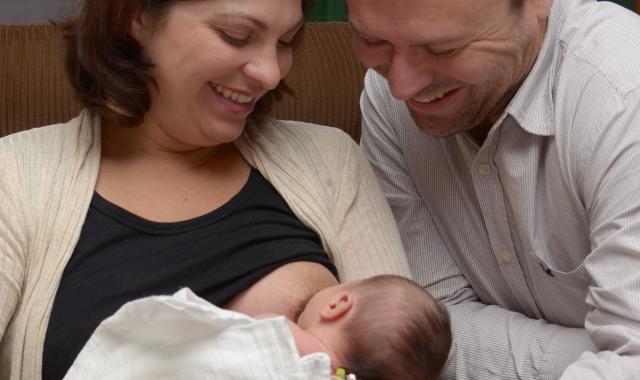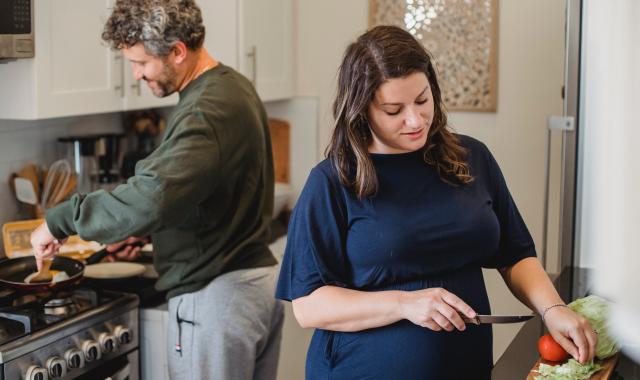Ways you can be there for your partner as your baby learns to breastfeed.

A new baby in your family can be rewarding yet challenging. Especially as many couples don't spend much time with young babies before having their own. One of the best things you can do is prepare for the physical and emotional demands of caring for your baby.
Even if you have a good idea of what to expect, you can still learn a lot about being new parents. A strong relationship with your partner will also help as your new baby needs so much attention and energy.
Your new baby will need care 24-hours-a day, 7-days-a week. Always being on call, with interrupted sleep, makes many mums very tired. Your partner may feel exhausted and less confident. It can take time for both parents to adjust to the lifestyle changes a new baby brings.
Being there for your breastfeeding partner during the early days of breastfeeding will help you both share the role of caring for your baby. Together, you will both become more confident. It will also feel good to support your partner to nurture your baby.
Supporting your partner's emotional needs
There are many ways you can offer support and care for your new baby:
Your partner needs lots of encouragement learning to breastfeed. The early days and weeks with a new baby can be very challenging. Sometimes it is difficult to adjust and becomes overwhelming. The days may blur into each other. New parents often feel as if nothing is getting done. Encourage your partner just to do their best. New mums need to hear that they are doing a great job and how proud you are of them.
Sharing ideas and thoughts can help put things in perspective. Sometimes it will be you who remembers an important bit of breastfeeding information when it is most needed.
Parents are often given conflicting information. Everyone has different ways of doing things. You may need to try several options before you find what works best for your family. Remember that your baby and your family are unique.
Encourage your partner to talk through any breastfeeding concerns with an ABA breastfeeding counsellor or check information with an ABA community educator on ABA's LiveChat service. You are also welcome to this.
You can also encourage your partner to attend a local ABA support group to chat with a trained volunteer and meet with other parents to share ideas and gain support. You’re welcome to come along too!
Practical support at home
Take as much leave as possible or maybe arrange some days working from home. Do as much as you can at home: making meals, doing laundry, general cleaning and looking after other children or pets. Accept offers of help from family and friends. This can help your breastfeeding partner to rest and recover from the birth.

Care for your partner by looking after personal needs - a drink, something healthy to eat, or an extra pillow for more comfort? Care for your baby while your partner has a shower or a sleep. Go for a walk or an outing together with the baby. A change of scenery, even if it’s only a walk around the block, can help everyone relax and get things back in perspective.
Talk to each other about how you are feeling. Be patient as you both learn about your baby and gradually feel more confident in caring for them.
Breastfeeding can feel time consuming especially in the early days. After all, it’s a big part of baby’s day. It’s common for partners and other family members to want to help relieve a mum of frequent feeding. However, you can offer support in many other ways and show your baby that love comes in different forms.
Options include cuddling your baby close, having some skin-to-skin contact, carrying your baby in a sling or baby carrier, changing nappies, bathing, massage and helping to settle after a feed. It's great to talk, sing and read to your baby. Spending time getting to know your baby is important.
Establishing breastfeeding may take time
Breastfeeding is natural but it doesn’t always ‘just happen’. Sometimes babies learn quickly, others take a little longer. Being knowledgeable about breastfeeding and normal baby behaviours can help prevent problems. Having good information when you need it can help turn things around.
Learn about common breastfeeding difficulties and what to do about them. Knowing about some of the things that can go wrong will help you recognise issues early. This can make them easier to manage.

Encourage your breastfeeding partner to continue even if it's a hard day. On days like this we all find it hard to think straight. Sometimes just knowing that it's all normal can be enough to encourage a new mum to continue breastfeeding. Sometimes just listening to your partner can be great support. A little more information may make a big difference to how you both feel.
Special situations
Special situations will require additional help from hospital and medical professionals who will provide specialised information and support. The ABA can provide breastfeeding support. Medical research shows breastmilk is important for pre-term babies, special needs babies and multiple births, as it is for all babies.
Postnatal and paternal anxiety and depression
Postnatal and paternal anxiety and depression are not uncommon after the birth of a baby and are more easily treated if recognised early. Be aware of the symptoms and consider this as a possibility if either of you have feelings of sadness or anxiety which appear, either suddenly or gradually, last for more than 2 weeks and affect your ability to function.
If you are concerned, talk to your doctor. For help with antenatal or postnatal depression, you can contact PANDA (Perinatal Anxiety and Depression Australia)
Don't be embarrassed to ask for help. A new baby can be an emotional time for any new parent.
© Australian Breastfeeding Association April 2022
Hear from a supported mum
Without my hubby's unwavering support, there is no way I would still be feeding my twins at 15 months! He never once, during all the madness and sleepless nights, suggested we feed any other way. He took over basically all meals and feeding me was his way of feeding the babies. We had discussed during pregnancy how important it was to us that the twins be exclusively BF and that it would be my full time job for quite a few months. He picked up soooo much of the slack in caring for our older child and for our home. Could not have done it without him.



